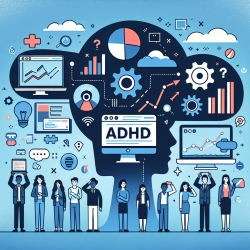Introduction
Attention-deficit/hyperactivity disorder (ADHD) is a prevalent and costly mental health condition that affects many children across the United States. Despite its prevalence, inequities in ADHD diagnosis persist, particularly among racial and ethnic minority groups. Recent research, such as the study "Unpacking Inequities in ADHD Diagnosis: Examining Individual-Level Race/Ethnicity and State-Level Online Information-Seeking Patterns," highlights the disparities in ADHD diagnosis and the role of online information-seeking behaviors in these inequities.
Understanding the Research
The study utilized data from the 2018 National Survey of Children’s Health and Google Trends to explore how state-level online information-seeking patterns relate to ADHD diagnoses. The researchers found that online searches related to ADHD varied significantly by state and were associated with the likelihood of ADHD diagnoses. Moreover, individual-level racial/ethnic background was linked to ADHD diagnosis, although there was no significant interaction between race/ethnicity and state-level online information-seeking patterns.
Key Findings
- State-Level Variations: The research identified significant state-level variations in online searches for ADHD-related terms, which correlated with the prevalence of ADHD diagnoses in those states.
- Racial/Ethnic Disparities: Youth of color were less likely to receive an ADHD diagnosis compared to White youth, even after controlling for socioeconomic factors.
- Impact of Online Information: Increased state-level online information-seeking was associated with higher ADHD diagnosis rates, suggesting that access to online information may influence diagnostic outcomes.
Implications for Practitioners
For practitioners working in schools or providing online therapy services, these findings underscore the importance of understanding both individual and state-level factors that contribute to ADHD diagnosis disparities. Here are some strategies to consider:
- Enhance Online Resources: Develop and promote accessible, high-quality online resources about ADHD that are culturally sensitive and available in multiple languages to reach diverse populations.
- Community Outreach: Engage in community outreach efforts to raise awareness about ADHD and reduce stigma, particularly in underserved communities.
- Advocate for Policy Changes: Support policies that address structural inequities in healthcare and education systems, ensuring equitable access to ADHD diagnosis and treatment services.
Encouraging Further Research
While this study provides valuable insights, it also highlights the need for further research to explore the intersectionality of race/ethnicity and online information-seeking behaviors in ADHD diagnosis. Practitioners are encouraged to engage in or support research that examines these complex interactions and their impact on mental health outcomes.
Conclusion
Addressing inequities in ADHD diagnosis requires a multifaceted approach that considers both individual and systemic factors. By leveraging online information-seeking patterns and advocating for equitable access to mental health resources, practitioners can contribute to reducing disparities and improving outcomes for all children.
To read the original research paper, please follow this link: Unpacking Inequities in ADHD Diagnosis: Examining Individual-Level Race/Ethnicity and State-Level Online Information-Seeking Patterns.










